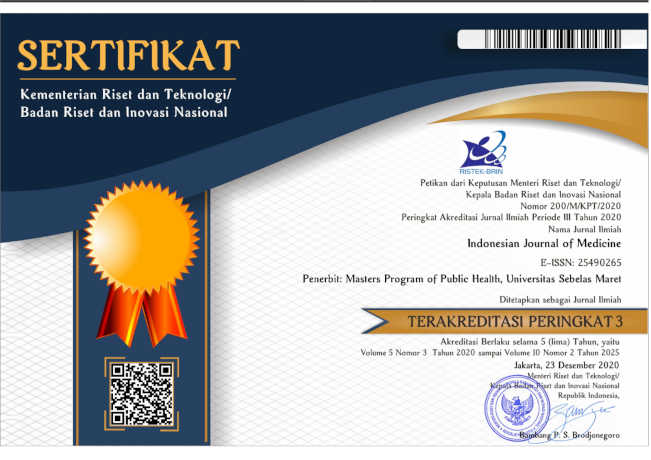Hypertension Self-Care Behavior and Its Associated Factors among Patients with Hypertension
DOI:
https://doi.org/10.26911/theijmed.2023.8.3.649Abstract
Background: Hypertension is a chronic medical condition that affects millions of people worldwide and can lead to severe health complications. Hypertension self-care behavior is important in managing their condition and reducing their risk of complication. This study aimed to to determine factors that associated with self-care behavior among patients with hypertension.
Subjects and Method: This was cross-sectional study, conducted at Boyolali Regency, Central Java. A total of 122 participant are included in this study. The Independent variables were including age, sex, education level, income, and duration of hypertension. The dependent variable was Hypertension self-care behavior. The data of Hypertension self-care behavior were collected by Hypertension self-care behavior questionnaire (HSCBQ). Knowledge about hypertension was measured using a modified questionnaire of hypertension evaluation of lifestyle and management (HELM). The data were analyzed by multiple logistic regression.
Results: Age ≥ 50 years (aOR=3.76; 95%CI=1.30 to 10.50; p=0.014), higher level of education (aOR=6.06; 95%CI=1.91 to 22.85; p=0.003) higher income (aOR=2.89; 95%CI=1.07 to 7.80; p=0.035), longer duration of hypertension (aOR=3.35; 95%CI=1.13 to 9.93; p=0.029) and good knowledge of hypertension (aOR=10.56; 95%CI=3.51 to 31.71; p<0.001) were associated and statistically significant with Hypertension self-care behavior.
Conclusion: Older age, higher level of education, higher income, longer duration of hypertension and good knowledge had statistically significant association with good Hypertension self-care behavior.
Keywords: age, duration of hypertension, hypertension self-care behavior, income, knowledge, level of education.
Correspondence: Akhmad Azmiardi. School of Health Science Mamba’ul ‘Ulum Surakarta. Jln. Ringroad, Mojosongo, Jebres, Surakarta, Central Java, Indonesia. Email: aazmiardi@gmail.com. Mobile: +6285245412021.
References
Ademe S, Aga F, Gela D (2019). Hypertension self-care behavior practice and associated factors among patients in public health facilities of Dessie town, Ethiopia. BMC Health Serv. Res. 19(1): 1–9. Doi: 10.1186/S1291301938800/TABLES/3.
Ajani K, Gowani A, Gul R, Petrucka P (2021). Levels and Predictors of SelfCare Among Patients with Hypertension in Pakistan. Int J Gen Med. 14: 1023. Doi: 10.2147/IJGM.S297770.
AlHadlaq RK, Swarelzahab MM, AlSaad SZ, AlHadlaq AK, Almasari SM, Alsuwayt SS, Alomari NA (2019). Factors affecting self-management of hypertensive patients attending family medicine clinics in Riyadh, Saudi Arabia. Fam Med Prim Care Rev. 8(12): 4003. Doi: 10.4103/JFMPC.JFMPC_752_19.
Anstey DE, Christian J, Shimbo D (2019). Income Inequality and Hypertension Control. J Am Heart Assoc. 8(15): 2023. Doi: 10.1161/JAHA.119.013636.
Bosworth HB, Powers BJ, Oddone EZ (2010). Patient SelfManagement Support: Novel Strategies in Hypertension and Heart Disease. Cardiol Clin. 28(4): 655. Doi: 10.1016/J.CCL.2010.07.003.
Buda ES, Hanfore LK, Fite RO, Buda AS (2017). Lifestyle modification practice and associated factors among diagnosed hypertensive patients in selected hospitals, South Ethiopia. Clin. Hypertens. 23(1). Doi: 10.1186/S4088501700811.
Dorans KS, Mills KT, Liu Y, He J (2018). Trends in prevalence and control of hypertension according to the 2017 American College of Cardiology/American Heart Association (ACC/AHA) guideline. J Am Heart Assoc. 7(11): Doi: 10.1161/JAHA.118.008888.
Gebremichael GB, Berhe KK, Beyene BG, Gebrekidan KB (2019). Self-care practices and associated factors among adult hypertensive patients in Ayder Comprehensive Specialized Hospital, Tigray, Ethiopia, 2018. BMC Res. Notes. 12(1). Doi: 10.1186/S131040194502Y.
Hussen FM, Adem HA, Roba HS, Mengistie, B, Assefa N (2020). Self-care practice and associated factors among hypertensive patients in public health facilities in Harar Town, Eastern Ethiopia: A cross-sectional study. SAGE Open Med. 8: 205031212097414. Doi: 10.1177/2050312120974145.
Irwan AM, Potempa K, Abikusno N, Syahrul S (2022). SelfCare Management for Hypertension in Southeast Asia: A Scoping Review. J Multidiscip Healthc. 15: 2015. Doi: 10.2147/JMDH.S367638.
Khan SA (2021). Hypertension: A sufficient risk factor for cardiovascular diseases. Pak. Armed Forces med. j. 71(3): 1103–1106. Doi: 10.51253/pafmj.v71i3.4021.
Lee EJ, Park E (2017). Self-care behavior and related factors in older patients with uncontrolled hypertension. Contemp Nurse. 53(6): 607–621. Doi: 10.1080/10376178.2017.1368401.
Mills KT, Stefanescu A, He J (2020). The global epidemiology of hypertension. Nat Rev Nephrol. 16(4): 223–237. Doi: 10.1038/S4158101902442.
Muntner P, Carey RM, Gidding S, Jones D W, Taler SJ, Wright JT, Whelton PK (2018). Potential US Population Impact of the 2017 ACC/AHA High Blood Pressure Guideline. Circ. 137(2): 109–118. Doi: 10.1161/CIRCULATIONAHA.117.032582.
Nam HJ, Yoon JY (2021). Linking Health Literacy to SelfCare in Hypertensive Patients with Physical Disabilities: A Path Analysis Using a MultiMediation Model. Int. J. Environ. Res. Public Health. 18(7): 3363. Doi: 10.3390/IJERPH18073363.
Pahria T, Nugroho C, Yani DI (2022). Factors Influencing SelfCare Behaviors in Hypertension Patients With Complications. Vasc Health Risk Manag 18: 463. Doi: 10.2147/VHRM.S366811.
Riegel B, Moser DK, Buck HG, VaughanDickson V, B.Dunbar S, Lee CS, Lennie TA, et al. (2017). Self‐Care for the Prevention and Management of Cardiovascular Disease and Stroke: A Scientific Statement for Healthcare Professionals From the American Heart Association. J Am Heart Assoc. 6(9). Doi: 10.1161/JAHA.117.006997.
RISKESDAS (2018). Riset Kesehatan Dasar 2018. Kementrian Kesehatan Republik Indonesia.
Salim H, Lee PY, Sazlina SG, Ching SM, Mawardi M, Shamsuddin NH, Ali H., et al. (2019). The self-care profiles and its determinants among adults with hypertension in primary health care clinics in Selangor, Malaysia. PloS One. 14(11). Doi: 10.1371/JOURNAL.PONE.0224649.
Sheppard JP, Schwartz CL, Tucker KL, McManus RJ (2016). Modern Management and Diagnosis of Hypertension in the United Kingdom: Home Care and Selfcare. Ann Glob Health. 82(2): 274–287). Doi: 10.1016/j.aogh.2016.02.005.
Song YH (2020). Hypertension in children and adolescents. J Korean Med Assoc. 63(7): 404–429. Doi: 10.5124/jkma.2020.63.7.404.
WHO (2021). Hypertension WHO. In Hypertension. 12–14. https://www.who.int/news/item/25082021morethan700millionpeoplewithuntreatedhypertension.
Zhang XN, Qiu C, Zheng YZ, Zang XY, Zhao Y (2020). Self-management Among Elderly Patients With Hypertension and Its Association With Individual and Social Environmental Factors in China. J Cardiovasc Nurs. 35(1): 45–53. Doi: 10.1097/JCN.0000000000000608.
Zainiyah Z, Susanti E (2020). Anxiety in pregnant women during the coronavirus (COVID-19) pandemic in East Java, Indonesia. Majalah Kedokteran Bandung. 52(3): 149153. Doi: 10.15395/mkb.v52n3.2043.
Zhang Z (2016). Univariate description and bivariate statistical inference: The first step delving into data. Ann Transl Med. 4(5). Doi: 10.21037/atm.2016.02.11.











